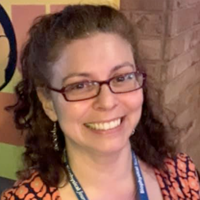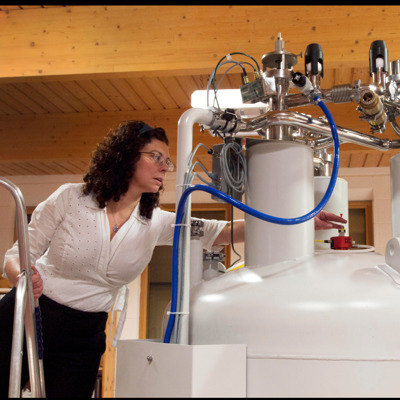
Tharin Blumenschein
Associate professor at University of East Anglia
A scientist is a child who hasn't lost their curiosity.
About Tharin...
Who am I?
"I am a mixture of three personality types: communicator, coordinator, explorer. I think this reflects very well who I am, and the work I do. As a communicator, I need to convey information to different people in different ways. And that includes teaching - which is a big part of my job - and writing research articles to tell other people the results of my research. As a coordinator, I help organise the work of different people to achieve a common goal. This goes from the laboratory, where I supervise students working in different projects that come together under a single research theme, and as Head of Natural Sciences, coordinating the efforts of different lecturers in different areas of science to deliver the best possible course to our students. And as an explorer, I research how proteins interact in the cell to cause infection. My favourite aspect of my work is the variety, which allows me to apply all these different aspects of my personality to different parts of the work!"
What do I do?
"I am an Associate Professor at the University of East Anglia, and Head of School of Natural Sciences - this second part of the job does not increase my salary at all. Associate Professor is a mid-career position, and I have just been promoted last year. Normally, people start working as academics in a university as Lecturer, with a starting salary of around £34,000. An academic role has many different aspects, making for very varied work: teaching of university courses, research in our specialist topic, and administration in different areas of the university. This is my favourite aspect of the job, as I enjoy all of those different roles! "
How did I get here?
"An academic career is a long path, but the initial stages are also fun and interesting! I wanted to be a scientist since I was 8, and then it was a matter of finding what branch of science. I ended up doing a university degree called Molecular Sciences, which is most similar to Natural Sciences in the UK - it allowed me to combine different branches of science to follow my own interests. When I graduated, I had decided that my key interest was in Biochemistry, to understand how proteins work at a molecular level. I then did a PhD in Biochemistry, which is an essential further study step for an academic career, or most positions in research. However, a PhD is a very different type of study: there are very few classes, and most of the time you're pursuing your research by doing experiments and discussing them with a supervisor. More often than not, PhDs in STEM are paid for - so you're learning, but also earning enough to live on. If anything, a PhD is most like an apprenticeship - it's an apprenticeship in science, which you do after graduating. After my PhD, I went to Canada to work in research in someone else's lab. This is called a postdoc, for post-doctoral research, and is normally a necessary step before establishing your own research somewhere. I wanted to learn a new technique, and there was a great lab to do it in Canada!While I was there, I met my partner at a conference. The conference was in the US, he was living in Germany, but he's British - science truly is international! So, when he got a job in the UK, I also got a postdoc job in London so we could be together. After a year in London, I was able to get a job as a Lecturer at the University of East Anglia, and set up my own laboratory and start teaching."
The life I live
"I don't have a hobby that takes a lot of my time, but I enjoy all kinds of leisure activities: reading, shopping, watching TV and movies... I love good food, and I make sure I have time for special meals. Before the pandemic, I also used to go out with friends, but now I've been mostly catching up online. I also really enjoy the outdoors, and try to go out for long walks when I can."
My typical day
"There is no typical day at work, as they vary so much! However, any day will include some time spent replying to emails, as I get a lot of emails from students and other staff at the university. A few times a week, I'll teach - this could be lectures, when I do most of the talking, tutorials, in which we discuss problems and exercises that the students have attempted before, IT labs, when the students will be working through problems at the computers, or laboratory practicals, where the students will follow a protocol for an experiment and analyse their results. I could also be in my research lab, supervising students doing their final year research project, and teaching them different experimental techniques. In addition to the time with the students, teaching involves preparation of the material for the teaching sessions, and marking of coursework that the students submitted.I also spend some time doing research, trying to understand how chlamydia proteins interact with proteins inside the human cells to cause infection. This involves analysing data from experiments done in the lab, writing the results in scientific articles, writing research proposals to obtain funding for my research, and reading the articles published by other people so I stay up-to-date with what's going on.There's also a fair amount of administration to do - different forms to fill, ordering items for the laboratory, paperwork associated with the teaching I do. As Head of Natural Sciences, there are also forms related to student requests - for instance, if someone wants to change to another course, or if they need to take a break in their studies. I am also a member of a few committees in the university, so I spend some time every week taking part in meetings to make decisions about the university."
My qualifications
"I grew up in Brazil, so I didn't do GCSE or A-levels. I couldn't drop any subjects until the end of high school, but had to finish all of them! At university, I got a BSc in Molecular Sciences - very similar to Natural Sciences degrees in the UK.I then got a PhD in Biochemistry. PhDs are often needed for research careers, in industry and academia.After working as a postdocotral researcher for 7 years (5 years in Canada, 2 years at Imperial College London), I got a job as a lecturer at the University of East Anglia.After 13 years as a lecturer, I got promoted to Associate Professor."
Tharin's Photos




